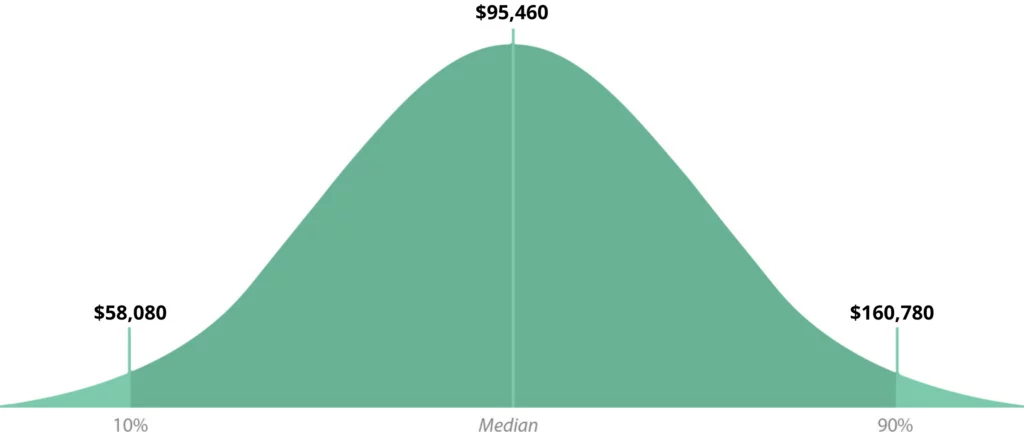
1. Overview: Job Responsibilities, Salary, and Common Requirements
2. A Comprehensive Guide to Becoming a Veterinarian
3. What Does a Veterinarian Do?
4. Signs You Should Consider Becoming a Veterinarian
5. How Do You Become a Veterinarian?
6. What are the Knowledge and Skills Needed to be a Veterinarian?
7. Popular Schools and Colleges in the U.S. for Aspiring Veterinarians
8. How to Gain Veterinary Experience
9. How to Get a Job as a Veterinarian
10. Learn About Geographic and Location Pay Differentials
11. Make Your Resume Stand Out
Veterinarians made a median salary of $96,640 in 2019. The best-paid 10 percent made $160,780 that year, while the lowest-paid 10 percent made $58,080.

Agricultural and Food Scientists
Animal Care and Service Workers
Medical Scientists
Microbiologists
Optometrists
Physicians and Surgeons
Veterinary Assistants and Laboratory Animal Caretakers
Veterinary Technologists and Technicians
Zoologists and Wildlife Biologists
Decision-making skills
Problem-solving skills
Manual dexterity
Compassion
Availability to work on uncomfortable hours
Biology
Zoology
Animals play a big role in our ecosystem—without them, the chain will be broken and who knows what will happen when they’re all gone? But not only do we need them in the ecosystem, we also want them to be our buddies for life! In fact, 67% of the American population or about 84.9 million homes have been reported to own a pet according to the 2019-2020 APPA National Pet Owners Survey. With this huge number of pet-owners, it is only logical to need the aid of veterinarians.
Veterinarians serve as the doctors of the animals. They seek to diagnose, treat, medicate, and provide overall care for all animals including pets, livestock, and other kinds of animals.
The need for these medical professionals are gradually increasing—with a job outlook of 16% which is faster than the average for any other profession as per the Bureau of Labor Statistics (BLS), things are looking up for those who want to pursue this career.
Veterinarians are medical professionals who provide healthcare for animals and aim to protect public health as well. They are doctors who took an oath in providing overall healthcare for animals, educating animal owners, and ensuring public health is not compromised because of animals.
Veterinarians may specialize in taking care of various kinds of animals like pets, livestock, exotic animals or zoo animals. Their typical duties include the following:
There are various types of veterinarians who serve the general public with their respective specializations. Some of them include the following:
In veterinary medicine, you can’t just wing it. You have to possess the initial factors that will determine how much you’ll succeed in this field. You will spend grueling years learning the scope of the field, so you have to prepare for it. To know if you are someone cut out for the role, here are the telling signs:
Most people tend to pursue a career as a veterinarian because they consider themselves an animal lover. There is no veterinarian who doesn’t like to be with animals. First of all, the field itself deals with the study and care for animals—so it is a must to feel for them. If you don’t have any hatred or fright of animals, then you can be comfortable fulfilling the role.
Have a genuine interest in the study of knowledge? If yes, then you are one step ahead of being perfect to be a veterinarian. To become one takes up an ample amount of time that will make someone doubt himself if he can conquer all the requirements. If you are not one to give up for your love of knowledge, then you can totally nail this career.
As much as you are around animals, you are going to be around people, too. If you are not comfortable talking to people, you can’t be a good veterinarian as this role demands talking with tons of clients. On the other hand, if you are very much into people, then you can totally wing it during consultations.
All kinds of doctors need to have excellent communication skills as they are interacting with lots of people including their patients, clients, and colleagues on a daily basis. As a veterinarian, you are also required to simplify too scientific terms that ordinary people cannot understand.
Not that you enjoy the pain of others, but if you do not feel squeamish under uncomfortable situations that include pain, blood, surgery, dressing wounds, etc. then you can stomach to be the healing hands of these animals. The role of veterinarian doesn’t just revolve around giving medications, it also includes surgeries and other painful procedures that should be done in order to save an animal. You should have the guts for all of that.
Can you contain your real emotions when you think it is not appropriate to be emotional? Your strong emotional stability will play a vital role in fulfilling your duties as you will often deal with life-and-death situations. You have the responsibility of informing your clients how their pets are doing and you cannot break down when you know there are fatal cases.
Working on a weekend, holiday or even wee hours cannot be helped in fulfilling clinical responsibilities. If you feel like this won’t be a problem for you at all, then you can go ahead and pursue this career. After all, your main role here is to look after the safety of the animals and you should be invested in that even if it means compromising personal time.

To be a veterinarian is quite work. You need the patience to meet the end as this requires a series of requirements that take up not just four, but eight years of educational background to accomplish. How prepared are you to conquer all this?
Here are the set of requirements that an aspiring veterinarian must meet to finally gain the title:
In order to get into a vet school, you should have graduated a 4-year degree program that covered some subject in science like chemistry, physics, organic chemistry, biology, mathematics, and genetics. These subjects serve as prerequisites to enter a vet school as these provide a comprehensive introduction to veterinary medicine.
Upon earning a bachelor’s degree, the next step you shall take is entering an accredited veterinary school to garner your DVM. Aside from a degree program that offers the prerequisite subjects, most vet schools prefer students who have direct experience working with animals. So you may consider volunteering for any charity work that provides animal health care.
In order to attain a DVM, you will have to go through a 3-year academic and clinical immersion plus 1-year on-field training to get hands-on experience. Upon completing these, you will finally earn your DVM.
All states require veterinarians to earn their licenses in order to practice. Upon finishing the educational requirements, you must pass the exam administered by the North American Veterinary Licensing Examination in order to start your practice.
In addition, most states require you to pass the state-level licensing examinations so you ought to prepare for that as well because each state has its own set of laws and regularizations. However, if you are employed by the state or federal government, you may skip the state licensing as they have a different requirement.
For some, earning your license is not enough. Specialization is often needed to practice in the field and this is done through additional training and educational pursuance. Here are the 22 sub-disciplines that specializes in animal care:
It’s not just the gift of knowledge that makes one successful in this career–one should acquire the skills that will make him thrive in this field. Together with the obtained clinical experience, the following skills are needed to fulfill his responsibilities as a veterinarian.
Just like any other profession, strong communication skills are highly needed in this profession. You are constantly interacting with various people who need your supervision and explanation so you must be a good communicator in order to effectively fulfill your duties. Not only are you responsible for explaining diagnoses and medications to your clients, but you are also in charge of giving instructions to your clinic staff.
You are going to be responsible for a lot of decisions in the course of your practice as you have the authority. So you need to be keen, alert, and methodological in making these decisions that affect the health of the animals.
Dealing with lives, you must have the heart to heal others and promote the wellness of the animals. You must be able to provide utter kindness and respect to the animals and their owners.
Being in the medical field, you are always finding resolutions for the medical conditions of animals. Providing the needed resolutions will prove how competent you are in your job as this is your main responsibility as a veterinarian.
No one can fake love for animals. Your genuine care for them will take you places as you of all people are invested in providing the care they deserve. If you have uncertainties with animals, think again. In the course of your practice, you are going to deal with a bunch of them.
As a doctor performing surgeries and treating wounds, you are required to have good control over your hands. You cannot afford to make mistakes when dealing with this kind of situation as you are the only one trusted to do these.
You have garnered years of studying and training to be a veterinarian. You are expected to be knowledgeable in using various equipment when performing examinations or surgeries to animals. After all, you are the sole operator of these medical equipment.
As a doctor, sometimes you won’t be able to control your duty hours especially when serving on clinics. There will be times wherein you will be required to stay for long hours and tend to the help of animals. It’s quite demanding and you should be okay with that.
Check out this list by US News & World Report for the best veterinary schools in 2019:

During your application, the experience will set you apart from other candidates. This is because the more exposure you have to supervised veterinary practice, the more it demonstrates your knowledge and capabilities. You even need this experience upon your application to veterinary school. Usually, vet schools require their applicants to have 400 hours of veterinary experience.
Kinds of veterinary experience to look for:
Here are some tips on how you can gain veterinary experience:
When looking for an institution to gain experience from, chances are, you’ll navigate through veterinary clinics and shelters nearby. However, you have many options to look out for.
Some gain experience from working for animal research centers, food production facilities, aquariums, and more. Even better, you can try to explore multiple areas to demonstrate your well-rounded experience, which you can put in your resume.
One of the best strategies to find internships is by using your network to find a referral. You can have an advisor who can share a list of internships or clinics that allow students to assist veterinarians.
You may also join your school’s pre-vet club to find notable opportunities. Or, if you want to take it a notch higher, you can watch out for important veterinary events such as the American Pre-Veterinary Medical Association (APVMA) Symposium. This event comprises of exhibitions and seminars, giving you the opportunity to meet representatives from other schools. And this could be the perfect opportunity to extend your interest in having internships.
One way or another, you will be asked why you plan on interning for your prospect. You need to prepare for this as you don’t want to sabotage your chance of getting through.
To nail this, you must prepare your credentials for the interview. You must be able to explain why you are invested in working for the said clinic or institution. Be prepared for rejections; don’t take it by heart and learn to move past it to pursue other opportunities waiting for you.
Once you are in, you must ensure you take it all in. After all, you will include this veterinary experience on your resume—you need to prove that you have gained so much knowledge from it. That’s why you need to ensure you fully immerse yourself as you shadow the veterinarian or assist the facility you are working for.
Ask questions to seek enlightenment. Take notes on new learning you found out. Document your training well. Remember, take as many learnings as you can.
Upon the completion of your internship, don’t lose contact with them. Show your gratitude for allowing you to earn veterinary experience by writing them a thank you letter. After all, you still need a letter of recommendation, which only they can provide. If you had a remarkable performance, chances are, the veterinarian himself will be more than willing to write you one himself.
When you are done earning your license and pursuing any additional training, you are now down to finding your first veterinary job! So where do you find them and how do you land one? There are a lot of ways on how you can score vacancy and here’s a list of each option to help you.
Small animal clinics that tend to domesticated animals need a larger number of staff as they often operate daily or overnight. You have higher chances of finding a vacancy here as there is also a big number of clinics available in every location.
Your professional acquaintances may be able to provide recommendations for you. You and your previous colleagues, co-interns, professors, etc. belong to the same field and they can always hook you up with a referral. So always keep in touch with them and add them to your LinkedIn network.
Your local classified ads may not be as reliable for any job opportunities as clinics do not really post about them. However, do not lose hope because you can still find jobs in your area by browsing online job portals that offer convenient job search. Here are some of those portals you can search on:
Although not recommended for first-timers who are just gaining reputation and experience, opening your own clinic can be a good venture for you. You get to operate on your own, hire your own staff, and build your own name in the niche. There will be a lot of risks to take, but it is worth it to open up your very own vet clinic.
With a median wage of $95,640 in 2019, veterinarians are considered to have an impressive salary although the annual pay may still vary depending on the state you are currently in. Here’s a list of each state and its corresponding annual mean wage for veterinarians:
| State | 2019 Mean Annual Wage |
|---|---|
| Texas | $125,280 |
| New Jersey | $125,110 |
| Rhode Island | $121,900 |
| Virginia | $121,040 |
| New York | $120,580 |
| California | $116,440 |
| New Hampshire | $113,460 |
| Maryland | $113,340 |
| North Carolina | $112,930 |
| South Carolina | $112,580 |
| Connecticut | $111,440 |
| Oregon | $110,880 |
| Ohio | $110,110 |
| Delaware | $108,760 |
| Arizona | $107,700 |
| Illinois | $107,320 |
| Massachusetts | $107,030 |
| Pennsylvania | $105,670 |
| Idaho | $103,080 |
| Michigan | $103,840 |
| Alabama | $98,790 |
| Arkansas | $98,050 |
| Hawaii | $97,810 |
| West Virginia | $97,540 |
| Florida | $97,490 |
| State | 2019 Mean Annual Wage |
|---|---|
| Washington | $97,340 |
| Nevada | $96,540 |
| Tennessee | $96,020 |
| Alaska | $94,990 |
| Georgia | $94,970 |
| North Dakota | $94,680 |
| New Mexico | $94,390 |
| Vermont | $94,270 |
| Maine | $92,260 |
| Kansas | $91,990 |
| Colorado | $91,760 |
| Indiana | $91,260 |
| Minnesota | $91,030 |
| Wisconsin | $90,830 |
| Iowa | $90,210 |
| Louisiana | $90,210 |
| South Dakota | $89,130 |
| Utah | $88,810 |
| Wyoming | $88,040 |
| Missouri | $87,040 |
| Nebraska | $84,860 |
| Mississippi | $81,950 |
| Kentucky | $80,790 |
| Montana | $79,850 |
| Oklahoma | $74,530 |
Report from the Bureau of Labor Statistics
Upon choosing which clinic you are going for, you are to make sure that your resume fully reflects your qualifications to make a good impression. Your resume is the first point of contact your potential employer will see so make sure at just one look, they will know how qualified you are.
Besides your garnered license and certificates, it pays to ensure that your resume is polished and sufficient enough to showcase your specialties. To help you, here are some tips to curate your resume in an impressive manner.
Serving as your quick introduction, put a brief overview of who you are and what you are capable of. This should be a 2 to 3-sentence paragraph containing your title, specialization, working experience, and your objective as a medical professional. Ensure the clarity of your message and just get to the point to keep your objective brief and free from unnecessary details.
In reverse-chronological order, enumerate the clinical experiences you have had. Even for first-timers, surely there are experiences you can list down. Include the tasks you have handled and the remarkable cases that will boost your qualifications as a veterinarian. You won’t be enumerating your skill set so make sure that you give a brief overview of what you have done in those particular pieces of training.
You spent eight grueling years to earn your license so showcase these educational achievements you have. Starting from the most recent educational attainment, list them down in reverse-chronological order as well. This way, if you have any additional training and educational milestones, they will come first on your list to display your genuine interest in your field.
Upon earning your DVM and obtaining your license, you are bound to join professional organizations that will give you lots of career and growth opportunities. Being enlisted in at least one shows how much you are invested in growing your career in your chosen specialty. Here are some organizations and specialties recognized by the AVMA that also releases certifications:
You’re down to the last step of landing your job as a veterinarian. You have secured your interview and you must make sure you are fully prepared on the big day! We are here to help you in that aspect. Aside from the common interview questions asking why you want the job and where you see yourself in five years, we’ll focus instead on the specific questions for veterinarians like you.
Here are some of those questions you should watch out for:
Apart from dealing with animals, you are also required to interact with their respective owners. There will be times that clients will be coming to you in distress because of panic or tension due to unfortunate situations that their animals are in. You are responsible for keeping them calm and avoiding intensifying the situation.
The employer wants to know your capacity in such situations as you will be facing these often over the course of your practice. In order to pass this little assessment, your answer should display your patience and ability to handle these stressful events. You shall demonstrate your kindness and consideration to feel for your clients without actually causing more distress to them.
One of the hardest duties as a veterinarian is facing the worst-case scenario of telling your clients that their pets are down to their last moments and there is nothing to be done. As unfortunate as it can be, you have to tell them ahead of time before it’s too late. And you have to do it swiftly.
As a veterinarian, you are expected to share this heart-breaking news to them. You have to have strong emotional stability to handle the situation. Your answer must show how much you can balance your professionalism and your compassion.
It’s a common situation wherein the client will not agree with your decisions. As the person who has the authority, you cannot be too compliant to what they have to say. After all, you are the doctor and what you’re doing is just for the best.
To answer this question properly, you ought to prove that you practice your authority well, but you still put into consideration what your clients have to say. You might be the best person who knows what to do, but you should consider the fact that they are still the owners of the animals. They should be able to understand the fine line between what’s safe and what isn’t.
Meeting emergency duties cannot be helped when you have become a licensed doctor—it’s a part of the oath you have sworn to obey. There will always be circumstances when you cannot choose between your patients and your family.
To provide a good answer, just tell your potential employer your compliance with the call of duty. Show your genuine willingness to cover during emergency situations because any employer would not want it any other way.
This is a very touchy subject so you have to be careful on what you are about to say. Although it is logical to just be against the whole concept of breeding and go to opting for adoption instead, the key here is being honest with what you feel.
Just be honest about answering this question. It is your opinion that the employer is asking so your honesty is what they need.
Sharpen your skills in veterinary by taking these top online courses
Here are some additional training materials to guide you on immersing yourself in the world of veterinary medicine:



